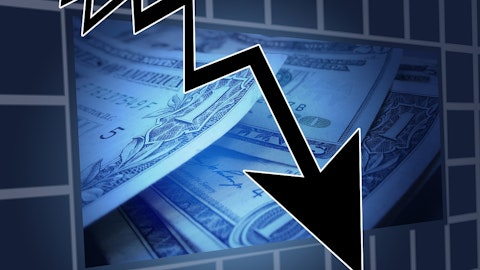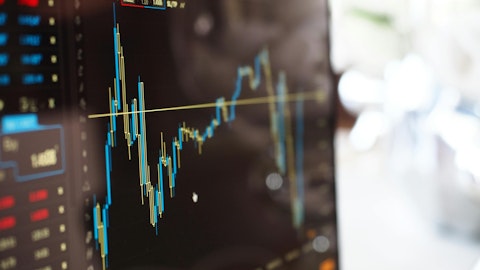In this article, we will discuss the 10 Best Fundamental Stocks to Buy According to Billionaires.
As per Fitch Ratings, the US tariffs are now at levels that continue to transform the global economic outlook, meaningfully increasing the US recession risks as well as constraining the US Fed’s ability to reduce the interest rates further. The ratings agency believes that tariff hikes are expected to result in increased consumer prices and reduced corporate profits in the US. The increased prices can squeeze real wages, impacting consumer spending, with reduced profits and policy uncertainty weighing over business investments. Notably, upward pressure on goods prices due to tariffs would mean that the US Fed is likely to become more cautious when it comes to further rate cuts.
Tariffs Can Be Reduced, Says UBS
In the base case (to which UBS assigns a 50% probability), the firm anticipates tariffs to be reduced from the levels that have been announced. That being said, the process is expected to take some time. UBS anticipates that there can be a tariff-related slowdown in growth in Q2 and Q3. Even if tariffs get reduced by the end of the year, the shock and related uncertainty can result in a near-term slowdown in the broader US economy, impacting FY 2025 growth.
UBS believes that market uncertainty is expected to remain elevated, with investors focusing on potential downgrades to consensus US economic and earnings growth projections, the risk related to the tit-for-tat escalation, among others. Therefore, there can be an extended period of volatility for the broader US equities.
READ ALSO: 7 Best Stocks to Buy For Long-Term and 8 Cheap Jim Cramer Stocks to Invest In.
What Should Investors Do?
Despite the uncertainties, UBS expects that the market will end the year higher. Apart from themes of AI and Power and resources, the firm has identified longevity and companies benefiting from the megatrend as the third Transformational Innovation Opportunity. The investors can also consider using yield-generating strategies so that they can benefit from current increased levels of volatility. UBS says that since the tariffs have been announced, negotiations to soften can now start.
Furthermore, the tariff revenue can be utilised to offset the cost of extending tax cuts. Additionally, the Fed may respond to weakening growth by cutting interest rates. Morningstar believes that some of the leading mega-cap stocks rated as “wide moat” have experienced a decline this year. The firm believes that wide-moat stocks are the most attractively valued, and it sees value throughout the entire range of such stocks.
With this in mind, we will now have a look at the 10 Best Fundamental Stocks to Buy According to Billionaires.

A business professional banking from their laptop, taking advantage of the company’s investment services.
Our Methodology
To list the 10 Best Fundamental Stocks to Buy According to Billionaires, we sifted through Vanguard S&P 500 ETF and Insider Monkey’s exclusive database of billionaire stock holdings to shortlist the companies that have at least ~8% revenue and net income growth over the past 5 years. For the stocks with the same number of billionaire holdings, we have used the number of hedge fund investors as a secondary metric to rank the stocks, as of Q4 2024.
Why are we interested in the stocks that hedge funds pile into? The reason is simple: our research has shown that we can outperform the market by imitating the top stock picks of the best hedge funds. Our quarterly newsletter’s strategy selects 14 small-cap and large-cap stocks every quarter and has returned 373.4% since May 2014, beating its benchmark by 218 percentage points (see more details here).
10 Best Fundamental Stocks to Buy According to Billionaires
10. Costco Wholesale Corporation (NASDAQ:COST)
5-year Revenue Growth: 10.7%
5-year Net Income Growth: 15.07%
Number of Billionaire Investors: 16
Number of Hedge Fund Holders: 96
Costco Wholesale Corporation (NASDAQ:COST) is engaged in the operation of membership warehouses. Bernstein analysts upped the company’s price objective to $1,177 from the prior target of $1,167, reaffirming an “Outperform” rating. Bernstein analysts highlighted the company’s continued success in attracting consumers. Furthermore, the analysts are optimistic about Costco Wholesale Corporation (NASDAQ:COST)’s potential for expansion, both domestically and internationally. They believe that the company would be able to maintain a steady pace in increasing the store count, resulting in a lengthy growth trajectory for the company.
Overall, Costco Wholesale Corporation (NASDAQ:COST)’s consistent performance and expansion strategy place it well for sustained growth over an extended period, as per analysts. Notably, S&P Global Ratings believes that the company has established a robust member base that sees value in their Costco memberships. As per the firm, Costco Wholesale Corporation (NASDAQ:COST)’s scale as the 2nd largest brick-and-mortar retailer in the world allows it to offer strong value to its members through reduced prices and unique products, aiding healthy renewal rates. S&P Global Ratings believes that the company’s sizable membership base is a strength since it creates customer loyalty and incentivizes increased purchases.
Madison Investments, an investment advisor, released its Q3 2024 investor letter. Here is what the fund said:
“Costco Wholesale Corporation (NASDAQ:COST) continues to demonstrate its commitment to sustainability by lowering its emissions. For example, it has converted its Kirkland Signature laundry packs from plastic tubs to a pouch. This has reduced plastic packaging by 80%. It has also moved to localize production of bulky items such as water, paper, and laundry detergents. Manufacturing these goods closer to the countries in which they are sold reduces emissions associated with shipping.”
9. Apple Inc. (NASDAQ:AAPL)
5-year Revenue Growth: 8.13%
5-year Net Income Growth: 10.8%
Number of Billionaire Investors: 21
Number of Hedge Fund Holders: 166
Goldman Sachs reiterated a “Buy” rating on Apple Inc. (NASDAQ:AAPL)’s stock with a maintained price objective of $294.00. The shipments of foreign-branded smartphones, including the company’s iPhone, in China went up by 9.2% in February YoY, as per Reuters calculations. Goldman Sachs’ strong support for Apple Inc. (NASDAQ:AAPL)’s stock reflects its confidence in the company’s performance despite the evolving market conditions in China. Notably, the market share dynamics as well as the recent product release remain the key factors in the firm’s analysis of Apple Inc. (NASDAQ:AAPL)’s stock. Elsewhere, Tigress Financial Partners exhibited optimism, with the firm maintaining a “Strong Buy” rating and increasing the price objective to $300, highlighting the company’s growth in services and innovation.
The integration of advanced AI capabilities into iPhones provides a strong growth opportunity for Apple Inc. (NASDAQ:AAPL) to fuel future upgrades and revenue growth. The features, including advanced image recognition, enhanced natural language processing, and personalized AI assistants, can offer reasons for customers to upgrade their devices. This can fuel iPhone sales and engagement with Apple Inc. (NASDAQ:AAPL)’s services ecosystem.
Columbia Threadneedle Investments, an investment management company, published its Q4 2024 investor letter. Here is what the fund said:
“The fund maintained a position in Apple Inc. (NASDAQ:AAPL) throughout the quarter through the release of the company’s new iPhone 16 in September. Company leaders were excited about the release of the new model, as this is the first model that will feature enhanced AI capabilities through the Apple Intelligence features. Sales for the first few weeks in October and November trailed behind year over year sales from the iPhone 15, as availability of Apple Intelligence was not compatible with all iPhone models. Apple announced a partnership with OpenAI that has allowed the integration of ChatGPT into the Apple ecosystem, separate from the core Apple Intelligence features. This partnership highlights continued progress from Apple to introduce AI capabilities into its products and we expect the iPhone 17 to have even more expansive AI capabilities, increasing potential demand for the new model that is on track to be released in 2025.”
8. Mastercard Incorporated (NYSE:MA)
5-year Revenue Growth: 10.7%
5-year Net Income Growth: 9.6%
Number of Billionaire Investors: 22
Number of Hedge Fund Holders: 151
Mastercard Incorporated (NYSE:MA) is a technology company that is engaged in providing transaction processing as well as other payment-related products and services in the US and internationally. Morgan Stanley analyst James Faucette maintained a “Buy” rating on the company’s stock, setting a price objective of $644.00. The analyst’s rating is backed by factors, mainly highlighting the company’s strategic expansion in its Value-Added Services (VAS) business. The analyst noted that Mastercard Incorporated (NYSE:MA)’s recent acquisitions, including Brighterion, Recorded Future, Ekata, and RiskRecon, have strengthened the capabilities in AI, digital identity verification, threat intelligence, and cybersecurity.
These acquisitions continue to enhance Mastercard Incorporated (NYSE:MA)’s capability to offer comprehensive security solutions that remain critical in the present digital landscape. Mastercard Incorporated (NYSE:MA)’s emphasis on integrating such services throughout the transaction lifecycle places it well for future growth. Elsewhere, Tigress Financial Partners maintained a “Strong Buy” rating on the company’s stock, increasing the price objective to $685. The firm lauded its robust market position and innovations in electronic payments and cybersecurity.
Alluvium Asset Management, an asset management company, released its Q4 2024 investor letter. Here is what the fund said:
“Last quarter we wrote about the credit card companies and the Fund’s latest investment, Visa (up 15.2%). With its strong share price performance, that position had grown to be greater than 5%. As we had discussed here, we consider there to be negligible differences in investment merits when compared to Mastercard Incorporated (NYSE:MA) (up 6.8%). Whilst Visa appears a little cheaper on traditional price metrics, our view is that Mastercard has marginally higher growth prospects. Irrespective, both are deserving positions in the portfolio, and given their similarities, and the 5/10/40 rule, in order for us to maintain maximum portfolio flexibility it made sense to sell a little Visa and buy a little Mastercard, and their combined position is 6.2%.”





